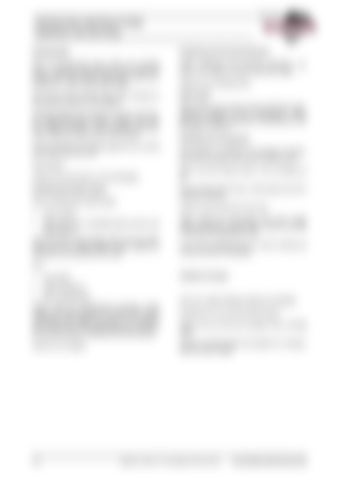BI015807
OPERATING INSTRUCTIONS Inspection and servicing Cleaning jobs
Fastening and securing elements
Prior to commencing work, clean your working area, if necessary and possible, with a stream jet (rubber parts and electric components with compressed air - refer to information label).
Check fastening and securing elements, e.g. bolts, nuts, washers, before using them again.
Use only lint-free cleaning rags when working on the hydraulic system or the engines.
Spare parts
Cleaning agents and solvents may give off harmful, readily flammable vapours. Never work with such agents except on well ventilated premises; never inhale the vapours and never smoke. Prevent solvents and cleaning agents from coming into contact with your skin. Wear gloves. Observe the instructions on the packaging.
Replace any damaged parts.
Spare parts must comply with the technical requirements specified by the manufacturer. Spare parts from original equipment manufacturers can be relied on to do so. Handling oils and greases Hot lubricant or hydraulic oil emerging uncontrolled from the system may result in severe burns. Never set foot withing reach of the emerging oil jet. Avoid contact with the skin. Wear gloves and firm protective clothing.
Handling flammable liquids When handling flammable liquids:
Used oil may be harmful to the skin.
§
never smoke,
§
keep away from unshielded light sources and naked flames,
Clean soiled skin thoroughly with warm soapy water and apply a barrier cream. Never use fuels or solvents for cleaning the skin.
Fuel and other consumables often have low flash points and are readily ignited. Never attempt to extinguish burning liquids with water.
If you have swallowed any oil, avoid vomiting but consult a doctor immediately.
Use: §
dry powder,
§
carbon dioxide or
§
foam extinguishers.
Visisble oil losses
Have any visible leakage repaired immediately.
Water used for extinguishing purposes would vapourize instantaneously on contact with burning substances and spread burning oil, for example, over a wide area. Water generates short circuits in the electrical system, possibly producing hazards. Notify the fire brigade.
3-4
Escaping oil is an environmental hazard. Soak up any oil that has escaped with a binding agent. Sweep up binding agent and dispose of it separately from other waste.
Update to version .01, see pages 3-25 and 3-93a
BA RH400(3 659 450.00)-EN

